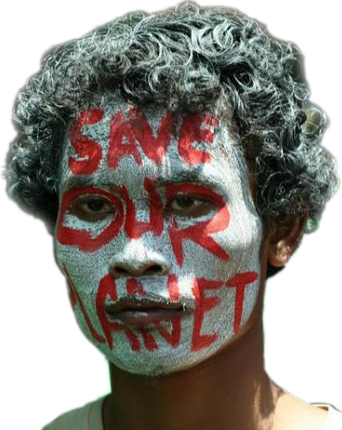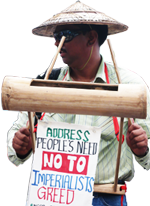Who we are
 The Peoples' Movement on Climate Change (PMCC) seeks to advance the People's Protocol on Climate Change as the Southern peoples' strategy and response to the climate change issue.
The Peoples' Movement on Climate Change (PMCC) seeks to advance the People's Protocol on Climate Change as the Southern peoples' strategy and response to the climate change issue.
What we advocate
|
The Peoples' Protocol on Climate Change (PPCC) aims to involve the grassroots sectors in the climate change discourse by developing their capacities for engagement and action. It also aims to pressure governments and international bodies to put the people's perpectives and aspiration on the negotiating table in drawing up a post-2012 climate change framework. |
Arabic English Amharic Bengali Spanish Francais for printing |
Why we advocate

The people are the worst affected and yet are the least empowered. It is urgent, more than ever, for the people to unite and create their own spaces to raise their own concerns and issues on climate change.
Syndicate
PPCC's five-point platform for action
- Comprehensive and concerted but differentiated and equitable global effort to achieve deep, rapid, and sustained emissions reductions to stabilize CO2 concentrations at 350ppm and hold global average temperature rise to 1.5 degrees Celsius.
- Demand the reparation of Southern countries and the poor by Northern states, TNCs, and Northern-controlled institutions to redress historical injustices associated with climate change.
- Reject false solutions that allow Northern states and corporations to continue harming the environment and communities, provide new and greater opportunities for profit, and reinforce and expand corporate control over natural resources and technologies.
- Struggle for ecologically sustainable, socially just, pro-people, and long-lasting solutions.
- Strengthen the peoples' movement on climate change.
|
|||||||||||||||||||||||||||||||||||||||||||||||||||
|
|||||||||||||||||||||||||||||||||||||||||||||||||||
|
More Articles...
|
|||||||||||||||||||||||||||||||||||||||||||||||||||
|
« StartPrev12345678910NextEnd » |
|||||||||||||||||||||||||||||||||||||||||||||||||||
| Page 9 of 25 | |||||||||||||||||||||||||||||||||||||||||||||||||||



 summit. “Improving development effectiveness in climate finance: challenges and opportunities” is an official COP-17 side-event. “Financing climate justice: voices from the South” is a side-event in the summit’s alternative space called the “People’s Space.” People from government and civil society are invited to speak. The two side-events are co-organized with several other civil society organizations. For more information, please contact Tetet Lauron at tlauron[AT]iboninternational.org.
summit. “Improving development effectiveness in climate finance: challenges and opportunities” is an official COP-17 side-event. “Financing climate justice: voices from the South” is a side-event in the summit’s alternative space called the “People’s Space.” People from government and civil society are invited to speak. The two side-events are co-organized with several other civil society organizations. For more information, please contact Tetet Lauron at tlauron[AT]iboninternational.org.